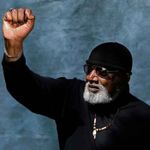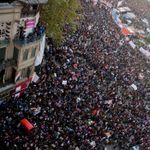Why so many recent uprisings have backfired
In Berkeley Talks episode 190, journalist and UC Berkeley alumnus Vincent Bevins discusses mass protests around the world — from Egypt to Hong Kong to Brazil — and how each had a different outcome than what protesters asked for.
“From 2010 to 2020, more people participated in mass protests than at any other point in human history,” said Bevins, author of the 2023 book, If We Burn. “These protests were often experienced as a euphoric victory at the moment of the eruption. But then, after a lot of the foreign journalists, like me, have left (the countries), and we look at what actually happened, the outcome was very different than what was originally expected or indeed hoped for.”
For his book, Bevins interviewed more than 200 people in 12 countries, all of whom were a part of the uprisings, whether they put the protests together or responded to them as government officials or lived through them.
In closing, he said, “When you properly want to restructure the system or make real problems for powerful forces, the counterattack is going to come.”
And, according to thinkers from around the world Bevins spoke to, including Berkeley sociology Professor Cihan Tuğal, instead of putting together an organization during an uprising, protesters should build in the off-season.
“Build real structures that can allow human beings that want to reshape the world in the same way to act together in the moment of the uprising," said Bevins, "because it’s very difficult to put together an organization in the uprising.”
This talk, recorded in October 2023, was moderated by Daniel Aldana Cohen, assistant professor of sociology at Berkeley and director of the Socio-Spacial Climate Collaborative, or (SC)2. The event was co-sponsored by (SC)2 and Social Science Matrix.
Listen to the episode and read the transcript on Berkeley News (news.berkeley.edu).
Photo by Hossam el-Hamalawy via Flickr.
Hosted on Acast. See acast.com/privacy for more information.









